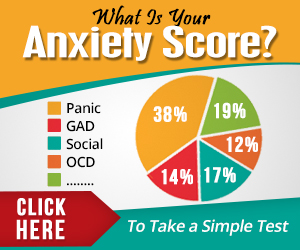Generalized Anxiety Disorder (GAD) affects over 4 million adult Americans every year, and is a condition where the person feels extremely worried or anxious on a regular basis. Exaggerated feelings of worry or anxiety are normal in some situations, but for people who have generalized anxiety disorder or related conditions, the feelings are out of proportion with the situation at hand. People with generalized anxiety disorder are unable to stop worrying about everyday events and situations, and may become overly concerned with money, work, school, health or their families. They spend their days in constant worry or anxiety over certain
Read more
Anxiety disorders affect millions of men and women every year, and most people experience a combination of emotional and physical symptoms depending on the severity of their condition. Anxiety disorders range from generalized anxiety disorder, obsessive compulsive disorder, phobias and social anxiety disorder, but almost all have the same spectrum of emotional symptoms that have significant effects on the person’s well-being and emotional health. The primary symptoms associated with all anxiety disorders is excessive, even irrational fear or worry about a particular situation, place or thing. However, the following emotional symptoms can also be present, and can occur frequently, or
Read more
Most people feel worried or scared when faced with a dangerous or stressful situation, but some people feel an excessive sense of worry or fear on a daily basis. People who suffer from anxiety disorders often feel fearful and anxious about the world around them, and may experience extreme effects of anxiety that turn into an anxiety attack of panic disorder from everyday situations. Understanding the root cause of an anxiety problem can take time, but there are several common characteristics and symptoms that indicate that an anxiety disorder is present, and may need to be addressed. Identifying anxiety disorder
Read more
Panic disorder is one of several anxiety disorders that involve an intense, abrupt and oftentimes debilitating period of discomfort and fear. Panic disorders affect millions of men and women of all ages, and can be triggered by several situations or circumstances, real or imagined. Gerald Klerman of the World Psychiatric Association and author of the book, “Panic Anxiety and Its Treatments” points out that there are several DSM-III-R diagnostic criteria that must be fulfilled in order to classify someone as having panic disorder. First, one or more of the panic attacks must have occurred when the person was exposed to
Read more
Recognizing anxiety disorder symptoms is just the first step towards overcoming the problem. The next step is to find a suitable anxiety treatment plan, and this may consist of medication, behavioral therapy, dietary changes, and nutritional supplementation. According to MedicineNet.com, “if no physical illness is found, [the sufferer] may be referred to a psychiatrist or psychologist who is specially trained to diagnose and treat mental illnesses. Treatments for generalized anxiety disorder most often include a combination of medication and cognitive-behavioral therapy.” Here are some of the most common anxiety treatment options available for people suffering from generalized anxiety disorder, social
Read more
Anxiety and panic disorders affect over 4 million adult Americans each year, and most people experience a combination of physical and emotional symptoms. In some people, the physical symptoms can be so severe that they lead to constant panic attacks and other problems. Physical symptoms can occur suddenly, or be a part of the person’s lifestyle if the anxiety disorder has been prevalent for an extended period of time. Almost all anxiety disorders are associated with a specific set of physical symptoms, so identifying these symptoms and experiences is necessary when considering treatment. In many cases, the mental health professional
Read more
Anxiety attacks and panic disorders affect an estimated 2.4 million Americans according to WebMD.com, and women are more likely to experience them than men. An anxiety attack can be described as an elevated sense of unease and a sudden acute episode of feeling overwhelmed and panicky. Anxiety attacks can occur on a regular basis, or randomly in people of all ages. Here are some ways to recognize anxiety symptoms: 1. Difficulty speaking and concentrating. The person experiencing an anxiety attack or extreme anxiety typically has difficulty getting focused and speaking properly. They may stumble upon their words, stutter, and feel
Read more
Panic disorder, generalized anxiety disorder, agoraphobia and social anxiety disorder are just some of the different types of anxiety disorders that affect millions of adult Americans every year. Anxiety problems are more common in women than in men, and are identified by extreme feelings of panic, worry, or a preoccupation with negative events that could occur in the person’s life. According to WebMD.com, an anxiety disorder “is a serious mental illness. For people with anxiety disorders, worry and fear are constant and overwhelming, and can be crippling.” Recognizing the different types of anxiety disorder can help the person cope better
Read more
Panic disorder and anxiety problems affect millions of people every year. Researchers say that more women than men are diagnosed with or experience symptoms of panic disorder and anxiety problems, and that in most cases, the cause is unknown. According to the National Institute of Health, approximately 10% of people who experience a panic attack become housebound and refuse to leave their home alone. Almost 30% of people suffering from panic disorder lose their job, get demoted, or settle for a job that they are overqualified for because they cannot handle their regular job responsibilities. Many people suffering from panic
Read more
For the millions of people suffering from anxiety attacks and panic disorders every year, handling stressful situations or maintaining a balanced lifestyle can be a challenge. Many people who have been diagnosed with anxiety disorder may also experience agoraphobia, an intense fear of having an anxiety attack in public. For many people an anxiety attack may lead to being judged or ridiculed, so the person may try and avoid social situations solely because of this fear. According to MedicalNewsToday.com, “the anxiety associated with agoraphobia is so severe that panic attacks are not unusual, and individuals with agoraphobia typically try to
Read more




